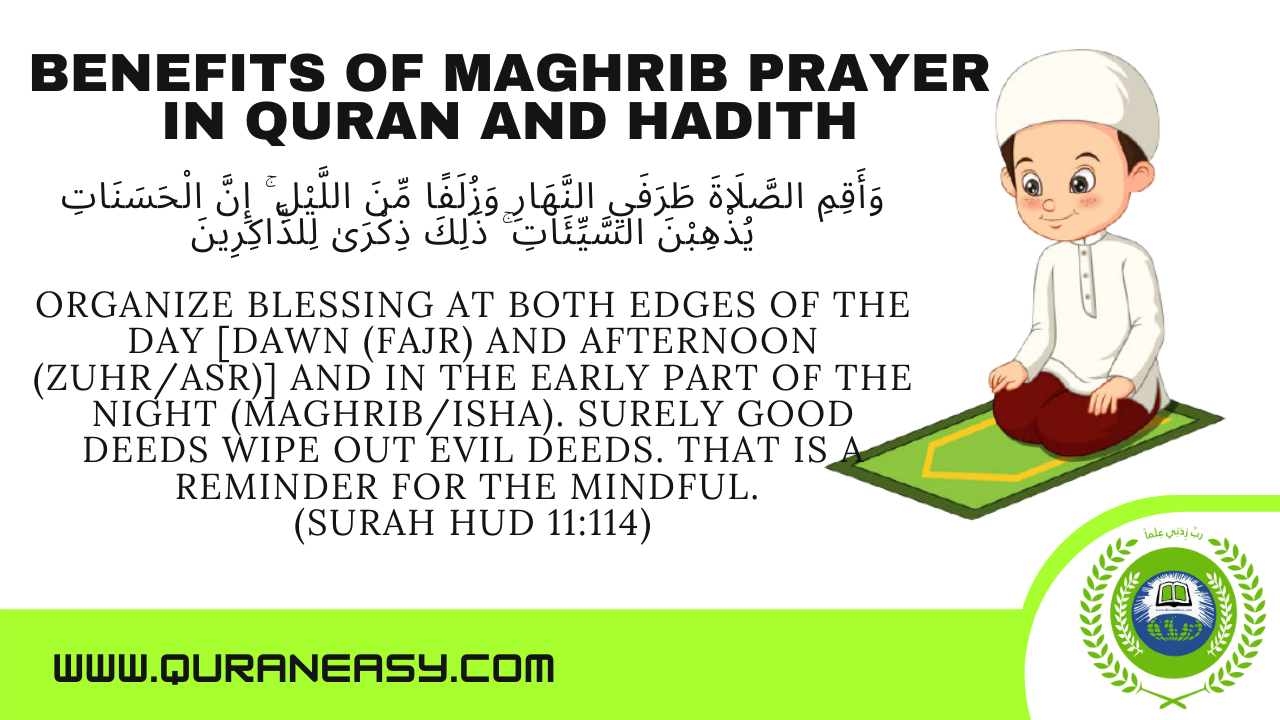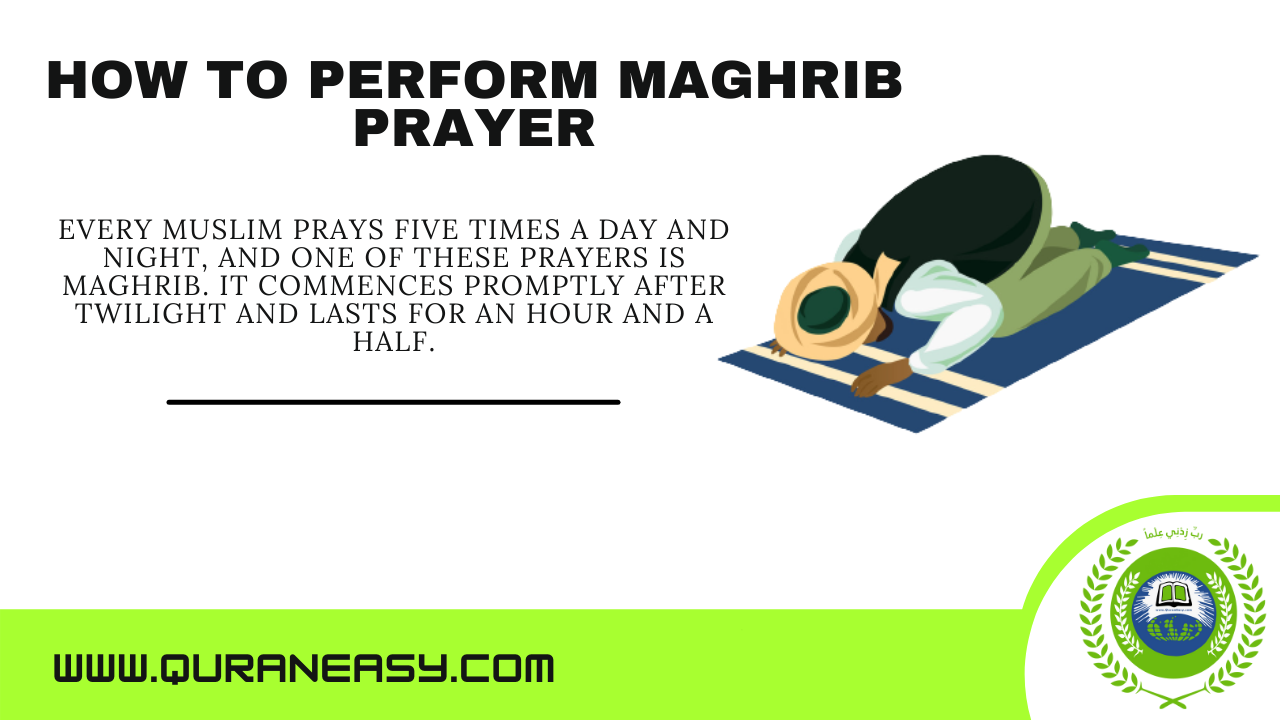When Does Maghrib Begin And When Does It End?
Every Muslim prays five times a day and night, and one of these prayers is Maghrib. It commences promptly after twilight and lasts for an hour and a half.
How many rakats are there in the Maghrib Prayer?
The Maghrib prayer has 7 rakats:
- 3 Rakats Fard
- 2 Rakats Sunnah Muakkadah
- 2 Rakats Nafl.
How to perform Maghrib Prayer?
Begin your performance of Maghrib prayer after sunset with three Rakat fard, reading Sana, Tauwwuz, and Tasmiya in the first Rakat, Alhamdu, and any surah from the holy Quran in the second Rakat, and Ruku and Sajda in the third Rakat. Do Qada Ula after Ruku and Sajda, and read Tashauhud, also known as Attahiyaat, and then stand up for the third Rakat.
Only read Alhamdu in the third rakat, then do Ruku and sajda, then perform Qada Akhrira, and read Tashauhus, Darud, and Duaa e Masurah in this qada, before performing Salam. Instructions for performing the Maghrib prayer step by step are given as follows:
-
The Niyyah of the Maghrib (intention)
Rather than being spoken aloud, the intention is set in one’s heart. We specify which prayer and the number of Rakats we will offer in niyyah.
-
Takbeer for starting Maghrib
We say Allahu Akbar (Mentioning Allah’s unrivaled greatness) while raising both hands to the shoulder or ear lobes. Then we position our right hand on the prime of our left on our chest. The location of the prostration drew our attention.
-
Sana (The Dua for beginning the Salah)
Recite the following dua:
Subhaa-naka Allah humma wa biham dika, wa tabaa raka ismuka wa ta’aala jadduka, wa laa ilaaha ghay ruka (Tasbeeh of Almighty Allah for mentioning greatness of Allah)
We provide one on one Online Quran Classes for kids and adults, In Ramadan we offer 30% Off and 3 Days free trial Classes
Click here to Join Online Quran classes now
-
Surah Fatiha (The Opening)
The following words are used to seek Allah’s protection from Shaytan:
Aoodhu Billahi minash-Shaytanir-rajeem
The Tasmiyah is recited as follows:
Bismillahir-Rahmaanir-Raheem
Then we recite the entire Surah Fatiha, including the Bismillah. Surah Fatiha must be recited in every rakah for Salah to be valid. It is written as follows:
‘Al hamdu lillahi rab bil ‘alamin,’ Ar rahman ir rahim. Maaliki Yawmid-Deen, Iyyaka na’ budu wa iyyaka nasta’in, Ihdinas siratal mustaqim, Siraatal-lazeena an’amta ‘alaihim ghayril-maghdoobi ‘alaihim wa lad-daaalleen
(Aameen)
-
Bowing (Ruku)
The word “Ruku” means “to bow.” We must enter the bowing position after reciting Allahu Akbar and placing both hands on the knees. Take Subhana Rabbiyal Adhim, which means (Allah the Supreme’s Perfection is praised) three times. Look down to the sujood spot, keeping your head in line with your back (prostration).
-
Rising after bowing
We should straighten up and say: Sami’Allahu liman hamidah before rising and saying: Rabbana lakal hamd (this means that Allah hears those who glorify Him).
Sujood (Prostration/Sajda)
With seven parts of our bodies (the forehead, nose, and palms of hands, knees, and toes) should touch the ground while saying Allahu Akbar. When we are in sujood, we say the following three times: Subhana Rabbiyal Aa’la which means (Praising Allah’s Perfection). We keep our arms away from the sides of our bodies and the ground. During every sajda (sujood) performance, we are in the closest possible proximity to our Lord. As a result, we must make a sincere Dua and pour our hearts out to Him.
Tashahhud in the position of Qaida (sitting)
After finishing the two sujoods of the second Rakat, we recite the Tashahud with wording as:
“Attahiyyaatu lillaahi wassala waatu , wattayyi baatu , assalaamu ‘alayka ‘ayyuhan-Nabiyyu wa rahmatullaahi wa barakaa tuhu, assalaamu ‘alaynaa wa ‘alaa ‘ibaadillaahi s-saaliheen. ‘Ash-hadu ‘an laa ‘ilaaha ‘illallaahu wa ‘ash-hadu ‘anna Muhammadan ‘abduhu wa Rasooluhu.”
Translation in English: “All greetings of humility are for Allah, and all prayers and goodness. Peace be upon you, O Prophet, and the mercy of Allah and His blessings. Peace be upon us and the righteous slaves of Allah. I bear witness that there is none worthy of worship but Allah, and I bear witness that Muhammad is His slave and His Messenger.”
After tashahhud, stand up again saying Allahu akbar, and perform the third and the final Rakat. In this Rakat, we only recite Surah Fatiha and then proceed to the Ruku without reciting any other surah. The Ruku and sujood are completed in the same manner as the first and second rakats. We recite the tashahhud again while sitting, as we did in the second Rakat, and then the Durood-e-Ibrahim as follows:
Allaah umma salli’ ala Muhammad wa’ ala aali Muhammad kama salayta ‘ala Ibraaheem wa’ ala aali Ibraaheem, innaka hameedun majeed. Allaah umma baarik ‘ala Muhammad wa ‘ala aali Muhammad kama baarakta ‘ala Ibraaheem wa ‘ala aali Ibraaheem, innak hameedun majeed. (Asking Allah to send prayers to Prophet Muhammad (PBUH) and his family in the same way that He did to Ibrahim).
-
Taslim will complete the Maghrib Salat
The three Fardh Rakats of Maghrib prayer is completed with the Taslim as:
As-Salamu’ alaykum wa rahmat-Allah, recited once to the right and once to the left.
After that, perform two rakats of sunnah, which is also important but not as much as fard, and read a surah in each Rakat of this Sunnah after Alhamdu.
Then, according to the Sunnah, perform two rakats of nafal.
Which Surah Should We Read During Maghrib Prayer?
In Maghrib, you can read any surah from Quran which you remember, but in the Sunnah, you should read any surah between Surah Zilzaal and Surah Naas. Because the Maghrib prayer is short, the Sunnah way is to read the short Surah during this prayer.

Benefits of Maghrib prayer in Quran and Hadith:
In Quran Allah (SWT) said:
وَأَقِمِ الصَّلَاةَ طَرَفَيِ النَّهَارِ وَزُلَفًا مِّنَ اللَّيْلِ ۚ إِنَّ الْحَسَنَاتِ يُذْهِبْنَ السَّيِّئَاتِ ۚ ذَٰلِكَ ذِكْرَىٰ لِلذَّاكِرِينَ
Organize blessing at both edges of the day [dawn (Fajr) and afternoon (Zuhr/Asr)] and in the early part of the night (Maghrib/Isha). Surely good deeds wipe out evil deeds. That is a reminder for the mindful.
(surah Hud 11:114)
On another place Allah said:
أَقِمِ الصَّلَاةَ لِدُلُوكِ الشَّمْسِ إِلَىٰ غَسَقِ اللَّيْلِ وَقُرْآنَ الْفَجْرِ ۖ إِنَّ قُرْآنَ الْفَجْرِ كَانَ مَشْهُودًا
Establish prayer at the decline of the sun [from its meridian] until the darkness of the night and [also] the Qur’an of dawn. Indeed, the recitation of dawn is ever witnessed.
(Al-Isra 17:78)
Maghrib prayer benefits are also mentioned in many Hadith:
- It was narrated from ‘Abbas bin ‘Abdul-Muttalib (رضي الله عنه) that: “The Messenger of Allah (صلى الله عليه وآله وسلم) said:
لاَ تَزَالُ أُمَّتِي عَلَى الْفِطْرَةِ مَا لَمْ يُؤَخِّرُوا الْمَغْرِبَ حَتَّى تَشْتَبِكَ النُّجُومُ
‘My Ummah will continue to adhere to the Fitrah so long as they do not delay the Maghrib until the stars have come out.”
- Aisha (رضي الله عنها) narrated that the Prophet (صلى الله عليه وآله وسلم) said
إِنَّ أَفْضَلَ الصَّلوٰةِ عِنْدَ اﷲِ صَلوٰةُ الْمَغْرَبِ، وَ مَنْ صَلَّی بَعْدَهَا رَکْعَتَيْنِ بَنَی اﷲُ لَه بَيْتاً فِي الْجَنَّةِ، يَغْدُو فِيْهِ وَ يَروح
“The prayer most favored by Allah is the Maghrib salah and one who prays two more rak’ahs after it, Allah will build a house for him in Paradise where he will dwell and find comfort.”
(Mu’jam Al-Awsat 7/230, 6445)
- Narrated `Abdullah Al-Muzani (رضي الله عنه): The Prophet (صلى الله عليه وآله وسلم) said,
لاَ تَغْلِبَنَّكُمُ الأَعْرَابُ عَلَى اسْمِ صَلاَتِكُمُ الْمَغْرِبِ
“Do not be influenced by bedouins regarding the name of your Maghrib prayer which is called `Isha’ by them.”
(Sahih al-Bukhari 563)
- It is narrated from Hudhaifah (رضي الله عنه) that the Holy Prophet (صلى الله عليه وآله وسلم) said:
“Read the two (Sunnah) Rak’ahs after Maghrib quickly as they are presented with the Fardh (prayer).”






Leave A Comment